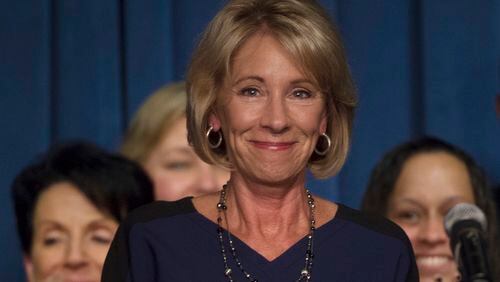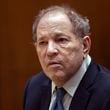The secretary of education has never been a high-profile post, probably because the U.S. Department of Education is an upstart, created in 1979 by President Jimmy Carter and still regarded with suspicion by critics of federal overreach.
The ED — the Department of Energy already had dibs on the DOE acronym — is the smallest of the cabinet departments, although it has 4,300 employees and a $69 billion budget. In order of succession to the presidency, the ED secretary is way down the line, 15 heartbeats away from becoming commander-in-chief. Even the agriculture secretary stands closer to the throne.
Most people couldn’t name recent education secretaries. (John King Jr., Arne Duncan, Margaret Spellings and Rod Paige.) However, many Americans can now identity the newest one, Betsy DeVos. Her rambunctious confirmation Tuesday led to the vice president casting the first tie-breaking vote in American history to settle a cabinet appointment.
DeVos’ notoriety reflects the unprecedented public opposition to her nomination, opposition that intensified after DeVos’ desultory Senate hearing performance where she botched a question on special education, cited grizzly bears as a reason rural schools might need guns and refused to affirm the need for greater accountability of the growing charter school sector.
A surge of incensed calls overwhelmed Senate offices and clogged voicemails, forcing voters to get creative to be heard. In desperation, a Utah woman sent Sen. Orrin Hatch a ham and pineapple pizza with a note asking him to vote “no” on DeVos. All but two Republican senators endorsed DeVos, dismissing all the petitions, postcards and phone calls as the work of threatened teacher unions and their favorite culprit, “the entrenched education bureaucracy.”
So why the uproar over the appointment of a federal official whose impact on local classrooms is constitutionally limited and essentially rests with its checkbook?
The ED website even contains a disclaimer about its power: “Please note that in the U.S., the federal role in education is limited. Because of the Tenth Amendment, most education policy is decided at the state and local levels. So, if you have a question about a policy or issue, you may want to check with the relevant organization in your state or school district.”
A Michigan billionaire with a penchant for giving large sums of money to Republican candidates, DeVos brings no education background to the post, having never attended public schools nor taught in one. However, she has staunch allies who know her through her family foundation and her commitment to vouchers and school choice, including former Florida Gov. Jeb Bush, who said, “Millions of families share Secretary DeVos’ vision for disrupting a failed status quo that has denied too many children access to a quality education. ”
DeVos is likely to re-invigorate the school choice debate in Georgia, which has remained cool toward vouchers and judicious in its approval of charter schools. But there are a few burn-down-the-village-to-save-it lawmakers who will likely seize the moment to push for more exit ramps out of public schools, including taxpayer-funded vouchers and increased tax credits. Two bills have already been filed in the House that would triple the $58 million ceiling now on private school scholarship programs. Georgia taxpayers get a dollar-for-dollar credit if they make contributions to scholarship funds that enable public school students to transfer to private schools. DeVos supports such tax credits.
The polarization around her views and her confirmation did not escape DeVos, who greeted ED staff Wednesday by noting, “There’s no need to pull punches. For me personally, this confirmation process and the drama it engendered has been a bit of a bear. In all, seriousness, for many, the events of the last few weeks have likely raised more questions and spawned more confusion than they have brought light and clarity…Let us set aside any preconceived notions and let’s recognize that while we may have disagreements, we can and must come together, find common ground and put the needs of our students first.”
About the Author







